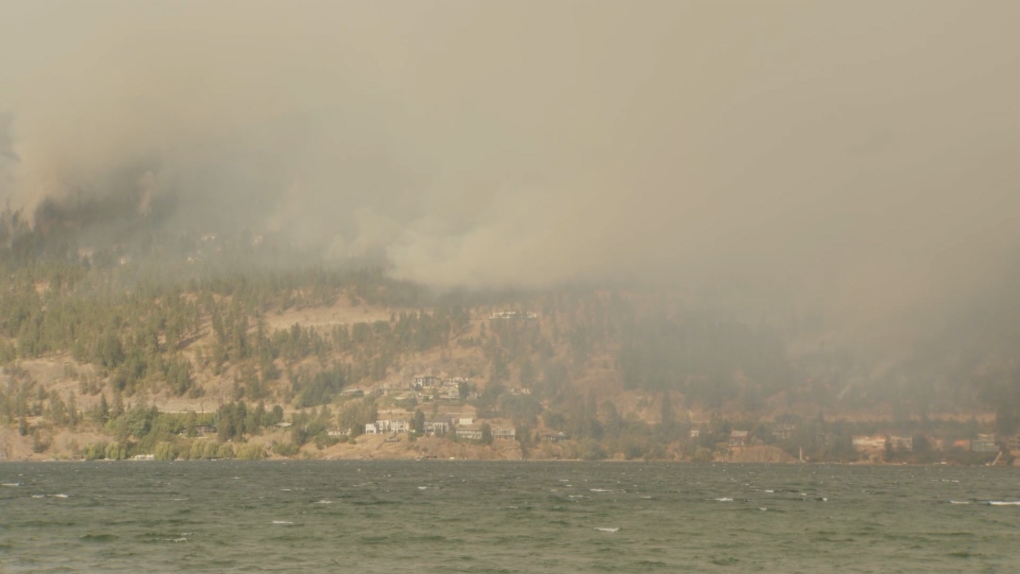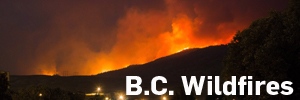Wildfires displace B.C. long term care residents and N.W.T. hospital patients
 Numerous homes have been destroyed by the McDougall Creek wildfire in West Kelowna, B.C.
Numerous homes have been destroyed by the McDougall Creek wildfire in West Kelowna, B.C.Nearly 900 seniors have been forced out of care facilities in a wildfire-ravaged region of British Columbia while the province has joined Alberta in receiving medical evacuees from the Northwest Territories, where thousands of residents have escaped dangerous conditions.
Susan Brown, CEO of Interior Health in B.C., said most of the residents were transferred from long-term care homes and memories of the devastation from past fires in the province may be exacerbating angst among both patients and employees.
“There's so much anxiety associated with wildfires now. We have a lot of staff and families that have been through this multiple years,” she said of previous blazes, including in 2003, when about 33,000 people fled the area and many homes were burned to the ground.
A separate group of patients of various ages with previously acquired brain injury has also been moved. The majority of seniors were transferred to safer areas of their large Interior region but some are now in Vancouver, about 400 kilometres away.
Up to 40 people were still in the process of being moved this week as the health authority worked with various agencies to deal with a vulnerable population in and around Kelowna, Brown said.
“Every effort” is made to get in touch with families who may be accustomed to visiting elderly relatives in facilities close to home, but some are currently vacationing outside of the country, she said.
“What we've done is set up a phone line that anybody can call if they're trying to locate a loved one,” she said of the province where 27,000 people have been forced to flee their homes and a state of emergency has been declared.
“I just can't imagine the mental anguish for all those families,” Brown said of those concerned about their relocated elderly relatives.
Transferring patients out of long-term care facilities is a time-consuming process because some residents with cognitive disabilities must be accompanied by staff who know them, Brown said. Those with dementia should not be made to feel pressured during an emergency evacuation, she added.
“(We) try to eliminate any anxiety or things that would create agitation. It's critical. And having an appropriate space for them to go to.”
Most seniors have not been moved by ambulance but by bus or other vehicles that can more comfortably accommodate older adults, Brown said.
“They feel vulnerable, and sometimes scared. It depends on their underlying condition and just how they personally cope.”
Eight of the nine facilities that have been evacuated are operated by private companies, and Interior Health runs one of them.
The Health Ministry said 16 care home residents from the Northwest Territories were transferred to B.C. by the Canadian Armed Forces, which also brought 19 hospital patients to the province.
“All were supported by BC Emergency Health Services paramedics as well as health authority staff and clinicians and triaged at Vancouver International Airport,” Health Minister Adrian Dix said in an emailed statement.
“Our B.C. health teams will be working with these medical evacuees to ensure they are able to stay connected with their families.”
Charlotte Taillon, spokeswoman for the Ministry of Health in Alberta, said 54 continuing care residents from the Northwest Territories have arrived in the province, which is also preparing to support between 150 and 200 homecare clients.
“Alberta is also supporting approximately 30 obstetric patients from N.W.T. Care is being provided at a number of sites in Red Deer, Calgary and Edmonton,” Taillon said in an email.
As well, about four acute-care patients and 39 people needing dialysis have been transferred to various sites in Alberta, she said.
All evacuees arrived in the province by small charter aircraft or the Canadian Armed Forces.
Jean Slick, a professor in disaster and emergency management at Royal Roads University in Victoria, is concerned that seniors who have been transferred to another jurisdiction will not get the support they need from visiting families.
“You've got formal care that's provided. But there's clear evidence that families are providing between 10 and 40 hours of care a week to people as well,” said Slick, who regularly cared for her mother in a Victoria facility before her death there in 2019.
“When you take people out of their care setting, they no longer have access to that informal care network.”
Slick said dementia patients in particular need more help and she's hoping family members will be regularly updated on how their loved ones are faring far from home.
Slick also noted some provinces are less prepared when disaster strikes so a national standard for response plans in facilities is needed.
Provincial legislation varies across the country and applies only to licensed operators, not private for-profit companies.
While B.C.'s emergency plans have been bolstered through its experience with wildfires, there is no requirement for updating its plan, other than for facility changes, said Slick, adding operators are also not required to hold any exercises to validate roles and responsibilities and identify gaps.
In Nova Scotia, for example, long-term care emergency plans must be updated and tested every three years. Ontario has the same testing requirement and licensees must conduct a planned evacuation at least once every three years
This report by The Canadian Press was first published Aug. 22, 2023.
Canadian Press health coverage receives support through a partnership with the Canadian Medical Association. CP is solely responsible for this content.
Must Watch
Top Videos
CTVNews.ca Top Stories

W5 Investigates 'I'm in financial ruin': Canadian homeowners sound alarm over contractor accused of fraud
This W5 investigation focuses on mother and daughter homeowners who found themselves in a fight with a general contractor over money they say they're owed, and over work that was never completed on their dream home.
1 hour ago
NEW | Liberal MPs gather for first time since Trudeau announced his resignation plans
Liberal MPs are meeting in Ottawa today for the first time since Prime Minister Justin Trudeau announced he will step down.
2 min ago
Southern California wildfire destroys many structures; governor declares state of emergency
A wildfire whipped up by extreme winds swept through a Los Angeles hillside dotted with celebrity residences Tuesday, burning homes and forcing the evacuation of tens of thousands of people.
Trump is open to using 'economic force' to acquire Canada; Trudeau responds
Prime Minister Justin Trudeau said 'there isn’t a snowball’s chance in hell that Canada would become part of the United States,' on the same day U.S. president-elect Donald Trump declared that he’s open to using 'economic force' to acquire Canada.
Thinking of a career change? Here's what employers are hiring for this year
As 2025 gets into full swing, gaps in Canada's job market offer new opportunities to start fresh -- in some sectors, more than others.
1 hour ago
A B.C. mom's real-life nightmare and the search to find her trafficked daughter
A Vancouver island mom shares the story of what happened to her teenaged daughter – and a warning for other parents about sex trafficking.
Canadian naval vessel shadowed by Chinese war ship in the East China Sea
CTV National News is on board the HMCS Ottawa, embedded with Canadian Navy personnel and currently documenting their work in the East China Sea – a region where China is increasingly flexing its maritime muscle. This is the first of a series of dispatches from the ship.
Patient dies in waiting room at Winnipeg hospital
An investigation is underway after a patient waiting for care died in the waiting room at a Winnipeg hospital Tuesday morning.
Limit coffee-drinking to this time window to lower early death risk, study suggests
Drinking coffee has repeatedly been linked with better heart health and prolonged life. But the benefits of coffee consumption could depend on when you drink it, new research has found.






























































